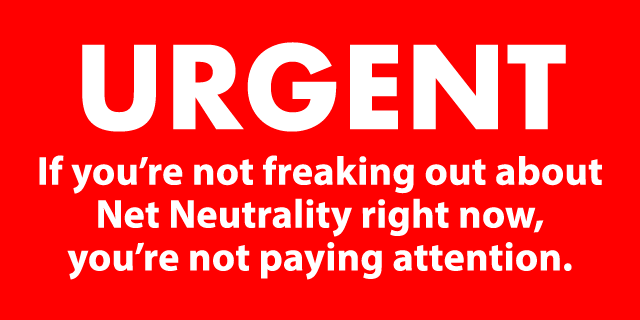
Join Public Knowledge to Discuss…
Net neutrality is on the chopping block. Public Knowledge has spent nearly ten years fighting for an open internet, but we expect that at the Federal Communications Commission’s December 14th meeting a majority of Commissioners will vote to eliminate our strong net neutrality rules. The current FCC has made dominant industry interests a priority, putting startup and consumer interests at risk. As one of the world’s largest centers for businesses and individuals financing, creating, and building the technology and inputs to the digital economy, Silicon Valley will be directly impacted by these new policies. At the same time, AT&T is seeking to merge with Time Warner, and Sinclair Broadcasting with the Tribune Company — potentially undermining video and broadband competition as net neutrality rules disappear. So, Public Knowledge is coming to California to discuss these important political shifts with engaged individuals, and to build new connections with individuals who want to learn more about standing up for an open internet.
Panelists for the discussion will include: Chris Lewis (Vice President, Public Knowledge), Evan Engstrom (Executive Director, Engine), Otessa Marie Ghadar (Professor, Director of DC Web Fest, Digital Content Creator & Advocate), Ernesto Falcon (Legislative Counsel, Electronic Frontier Foundation), and Brandi Collins (Senior Campaign Director; Media, Democracy, & Economic Justice, Color of Change).
The event will kick off with a reception from 6-7pm and will include a discussion from 7-8pm. We hope that you will join us and stick around afterwards for food and drinks until 9pm.
Please be sure to register, spread the word via Twitter, and keep an eye out for additional information coming soon.
GET TICKETS HERE
Tuesday December 5th, 2017
6:00 pm Reception
7:00 pm Program
8:00 pm Reception
Internet Archive
300 Funston Ave.
San Francisco, CA 94118
Leave the Net Neutrality regulations alone. The only people changing them helps is rich criminals.
Net Neutrality is not really neutral, it will kill free speach for real 🙁 11/25/17
Hi how can i contact with you guys?
The Internet Archive can be contacted through info@archive.org. Thank you for your interest.
Good God the saying “If It Isn’t Broke, Don’t Fix It!!!!!!” comes to mind, for aged now, we have had a system which works and does the job properly. So why the hell are the FCC interfering now. Leave it alone…….
What is the positive and negative impact for internet users in the world?
I will share your post to all my friends
Let’s say that one day you were driving down the road and you saw a billboard talking about insurance from “ABC” company. You want to find out more, so you go home and jump on the Internet. However, every time you try to connect to ABC company, the connection is incredibly slow or non-existent. Instead, you seem to always be ending up on DEF insurance company’s website. This is because unbeknownst to you your Carrier (such as AT&T, Sprint or Comcast) has entered into an agreement with DEF company to direct traffic towards their website.
Removing net neutrality grants carriers to right to determine what and how quickly they serve pages to you and of course how they charge you for it. It removes the flat (equitable) playing field that all URL’s currently have.
Imagine now that you are a little start up company trying to get your business off the ground. Let’s say it with a large, national chain that has the money to convince the Carriers to promote their websites and de-promote everything else. A little guy would have very little chance of success in cyberspace.
Leave the Net Neutrality regulations alone.
me too.
Considering the absolute “blindness” of the “Powers That Be” regarding what is right, fair, and equitable for the average, middle class American citizen, much LESS anyone who happens to be currently existing in the low-middle and lower financial classes, dont expect that writing “leave it alone” here to have much impact.
They are completely blinded to the FACT that we exist, that we don’t deserve to be treated as a group of “less thans” and that our views are frequently more fair and equitable than theirs regarding access to goods and services. $#!t talks, dollars walk, and the more there are of either, the louder they are.